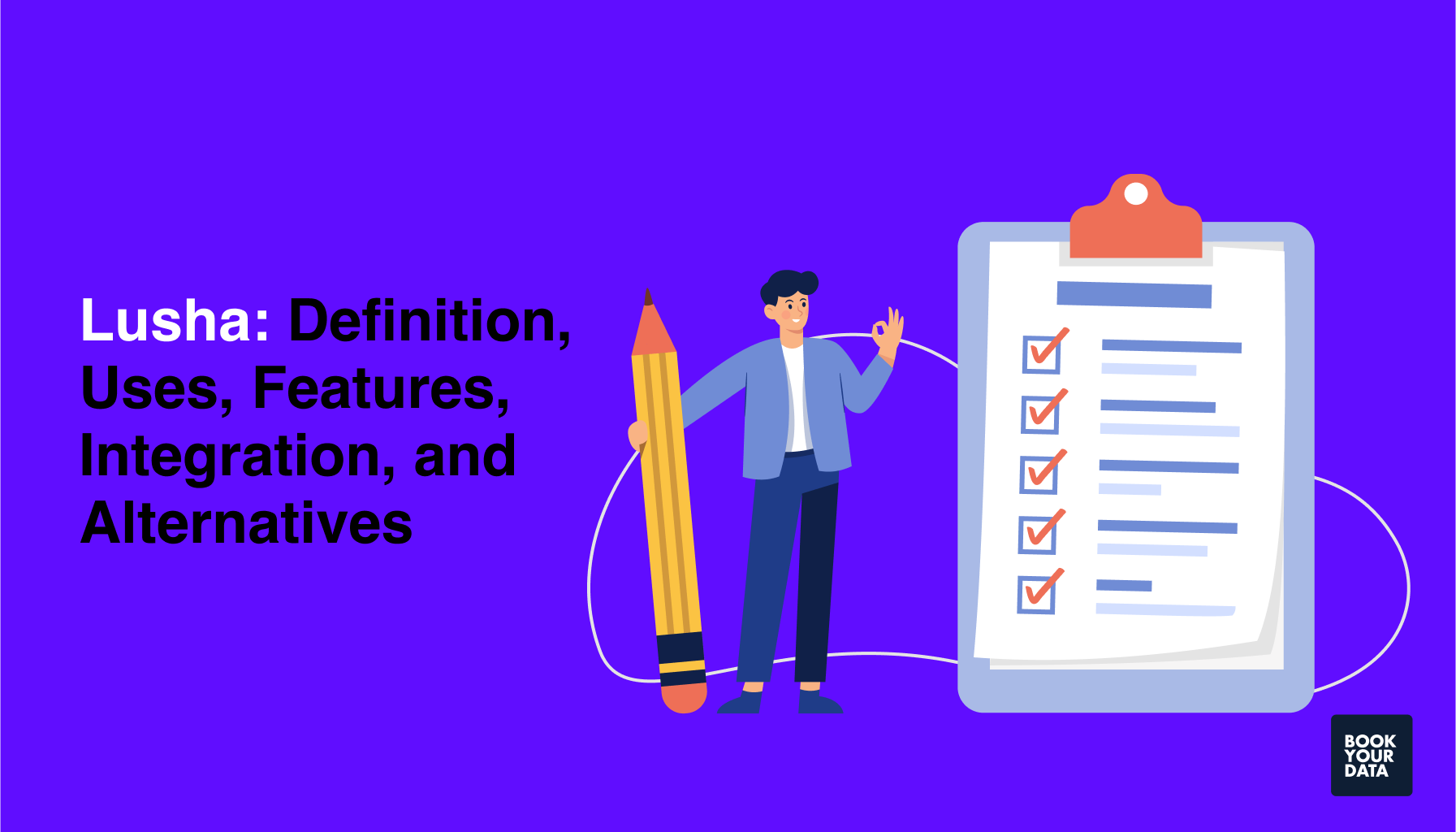Lusha Pricing: Plans and Costs in 2025
Lusha is the sales intelligence platform that is made to help sales, marketing, and recruitment teams connect with their ideal prospects. This B2B platform provides access to the most accurate and fully compliant global database of companies and decision-makers, and it has insights from over 1.5 million users. It can be used to identify the best companies and important decision-makers to target.
The pricing plans of Lusha include Free, Pro, Premium, and Scale plans. It is important for users to understand Lusha’s pricing structure because its cost is based on specific seat amounts and a complex credit system. It becomes difficult to predict total expenses as teams scale. This issue has been highlighted in G2 reviews by users who wish to scale their teams with the company’s growth.
Lusha’s plans are restrictive regarding CSV enrichment and bulk shows. Lower tiers only allow enrichment of a limited number of rows per file, such as Pro up to 300 and Premium up to 500, and bulk contact reveals are capped per report.
What is Lusha?
Lusha is a B2B sales intelligence platform that helps businesses find, connect with, and convert potential clients by providing accurate, up-to-date contact and company information. Sales managers, sales VPs, account executives, sales representatives, marketing departments, and recruiters use Lusha to find accurate B2B contact information for prospecting and outreach. It is important to note that this sales intelligence tool helps sales teams increase their lead generation, manage their workflows, and improve their sales strategies. More than 1.5 million users add and update the database of Lusha by sharing their contact details, such as email signatures and business card information.
What are the key features of Lusha?
The key features of Lusha are Chrome extension, CRM integration, intelligent lead generation, API suite, advanced search filters, contact data validation, data enrichment, and sales pipeline workflows.
The features of Lusha are listed below.
- Chrome extension: Lusha provides a Chrome extension to help users access contact information while browsing professional networks like LinkedIn. Its feature “Lusha Everywhere” allows users to extract the company’s contact information from LinkedIn, Salesforce, Gmail, and other sites without leaving their browsers. This feature helps businesses in achieving business goals of expanding reach and identifying new opportunities.
- CRM integration: Lusha easily integrates with main CRM platforms like Gmail, Outlook, HubSpot, Salesforce, and Zoho. It allows users to enrich contact data, access client information, and use Lusha directly within existing workflows. Leads from the Lusha database are imported into the company’s CRM and tracked through the sales cycle.
- Intelligent lead generation: Lusha uses AI tools and data to automate, optimize, and personalize the process of finding high-quality sales leads. It provides users with access to a vast database of business contacts which helps users to identify and connect with potential leads.
- API suite: Lusha’s API access helps businesses build custom integrations with their existing tools and platforms. It allows them to pull contact and company data directly into their proprietary systems. It also automates tasks like lead enrichment and updates the CRM without relying on manual processes. The API provides personalized integration for advanced teams with specialized needs.
- Advanced search filters: Users narrow down their search for prospects using specific criteria such as location, industry, company size, job title, revenue, department, and seniority level. This filtering option helps sales and marketing teams to accurately target their ideal customer profile. An advanced search filter saves time and resources for businesses.
- Contact data validation: Lusha maintains its data accuracy by verifying contact information regularly to make sure that users reach valid email addresses and phone numbers. The platform complies with various protection regulations, including GDPR and CCPA to ensure that the contact information provided is correct and ethically sourced.
- Data enrichment: Lusha offers a CRM data enrichment feature that automatically updates the existing contact lists by adding missing information, such as phone numbers and email addresses. Sales teams save significant time by removing difficult manual data entry and updates. Enrichment also helps in precise lead scoring and segmentation by updating detailed firmographic and technographic dimensions.
- Sales pipeline workflows: Lusha helps users create and customize structured sales pipeline workflows within its interface. This helps them follow a framework to track and manage leads through clear stages aligned to the sales funnel. Lusha also offers team collaboration tools like shared workspaces and the ability to share leads seamlessly for teams working together on lead generation.
What are the pricing plans of Lusha?
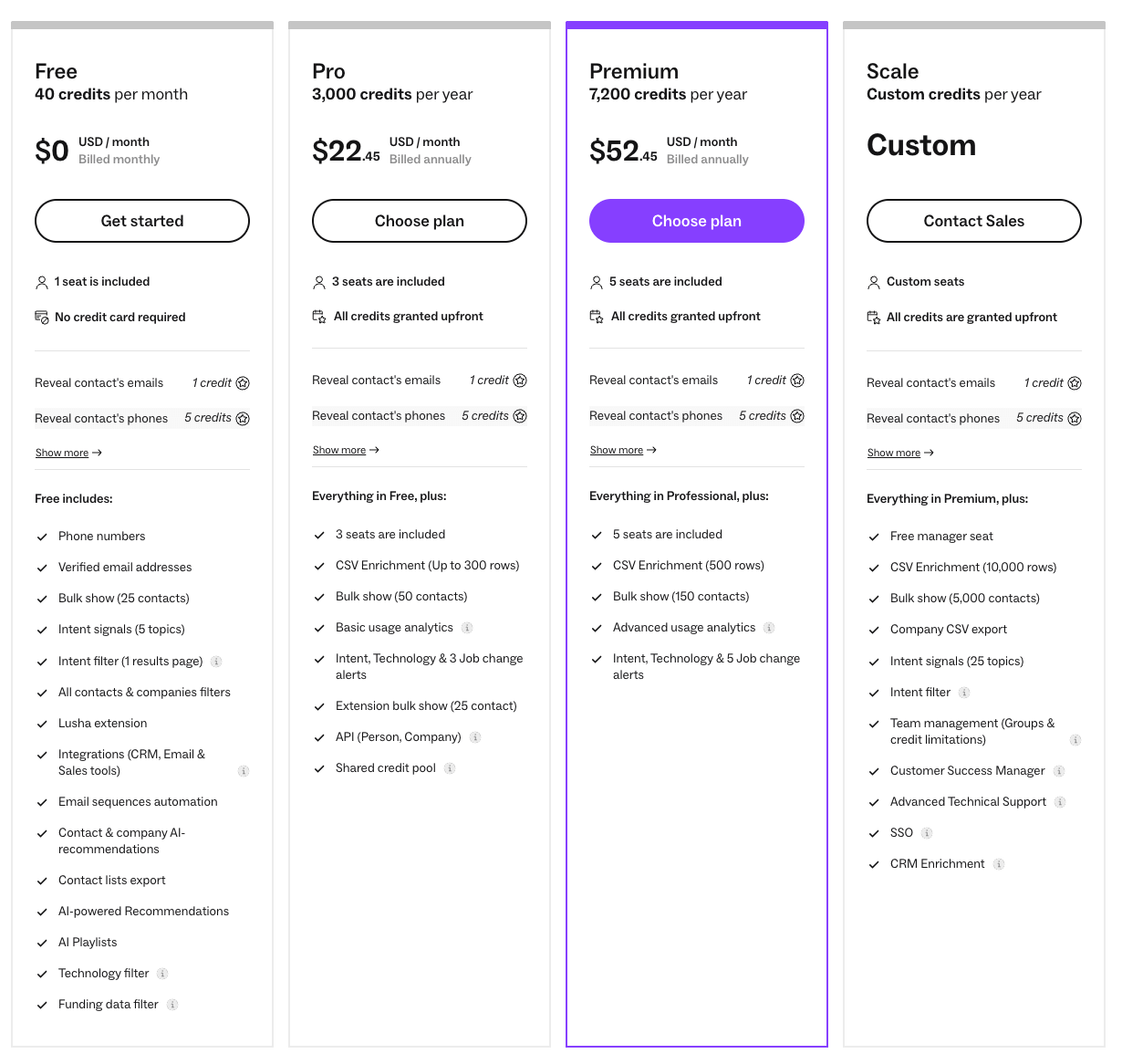
The pricing plans of Lusha include a free plan, pro plan, premium plan, and scale plan.
The pricing plans of Lusha are explained below.
Free plan
The free plan of Lusha gives access to a single user seat and 70 Lusha credits per month. These credits are used to get contact information from the database. It costs 0$ per month, and a credit card is not required to access the free plan. Users can use 1 credit to access all the available contact information on a single contact, including email addresses and phone numbers.
Users can access Lusha’s extensive B2B contact database to find direct phone numbers, landline numbers, and email addresses, and it also gives users a Chrome extension. The plan allows users to create bulk lists of up to 25 contacts per report and receive one free alert when a contact changes companies or job roles. It also gives access to basic prospecting features, including the ability to search and filter contact intent signals (up to 5 topics), company size, and department.
Lusha’s free plan is best for small businesses, but restrictive for large organizations as compared to its other three plans.
Pro plan
The pro plan of Lusha costs $22.45 per month for users starting at 3600 credits/month, $29.95/month for users at 4800 credits per month, $37.45 per month for users at 6000 credits annually, and $44.95/month for users at 7200 credits annually.
A pro plan gives access to three user seats, and credits are shared by everyone on the account. This plan allows users to create bulk lists of up to 50 contacts per report, and users can configure reports with up to five buyer intent signals. Users can enrich up to 300 rows of existing business data in CSV files, and buying an annual account saves businesses 25%.
The pro plan of Lusha gives access to its Chrome extension, which is Lusha Everywhere, to access contact data directly from LinkedIn, company websites, Gmail, and Salesforce. Users also receive three job change alerts per month whenever a contact changes companies or job roles.
This pro plan is suitable for small businesses and entrepreneurial setups that require basic lead generation support and CRM functionality.
Premium plan
The premium plan of Lusha starts with 800 credits monthly at $69.90 per month when billed monthly, or 9,600 credits annually at a monthly equivalent of $52.45 per month when billed annually. Monthly users can purchase additional credits in blocks of 200 for approximately $17.50. Users on an annual plan can purchase additional credits in blocks of 2,400 for approximately $13.10 per month.
Users can assign employees up to five user seats and gain access to credit bundles of between 800 to 5,400 per month, or bundles of 9,600 to 64,800 credits for annual plans. They can configure reports with up to five buyer intent signals, and create bulk lists of up to 150 contacts. They can gain access to five change job alerts when some contact changes the job.
Users can gain access to analytics about how their team members are using credits to improve direct reporting and search tools. Its expanded reporting tools allow users to add up to 500 rows worth of business data to enhance and improve existing spreadsheets.
Lusha’s Premium plan is ideal for growing teams that need more advanced functionalities to drive more lead generation, outreach, and sales operations.
Scale plan
The scale plan is a customizable pricing plan for larger companies that require the ability to execute a high volume of curated searches. Its price depends upon the specific needs of businesses and is available upon request from the vendor.
Lusha’s custom or scale plan gives access to a custom number of seats, a customized package for credits, and a credit pool that can be shared between user seats. Users of the scale pricing plan configure reports of up to 25 buyer intent signals and create bulk lists of up to 5000 contacts. They gain access to tools allowing them to add up to 10,000 rows worth of business data.
Scale plan offers integrations with powerful CRM tools including Salesforce, HubSpot, Outreach, Microsoft Dynamics, Salesloft, Bullhorn, Pipedrive, Zoho, and Zapier. It also provides users with a Customer Success Manager and Advanced Technical Support team to resolve issues. Custom users gain access to advanced usage analysis to best organize their teams and allocate credits relative to goals. They also get API access which enriches their database or web applications with person and/or company details.
This plan is ideal for enterprise-level businesses as it can cover unlimited high-quality leads, but is expensive for small or mid-sized businesses. It is important to contact Lusha’s sales teams directly to receive accurate and personalized pricing details for Lusha’s custom plan.
What are Lusha's credits?

Lusha credits are the platform’s internal system used to access contact information, which provides users with control and flexibility over their data usage. When a user uses the “show contact” button for a prospect, the appropriate number of credits is deducted from their account depending on the type of information they get. For example, if a user reveals the email address of a contact, 1 credit is consumed, while 10 credits are deducted to reveal the phone number.
When a user accesses a new contact’s details, credits are used based on the data type. If they enrich a database or run bulk operations, credits are also consumed per record or contact revealed. Users need to purchase more credits once they use all of their allocated credits.
For example, if a business wants 50 email prospects, they will need 50 credits, and 100 credits to prospect 10 phone numbers.
Rolling over and expiration policies depend upon the subscription type. On monthly plans, unused credits roll over for up to 12 months as long as the subscription remains active. If a business downgrades or cancels its plan, any remaining credits are reset at the end of their current billing period and do not roll over to a new term.
What are the additional costs and add-ons of Lusha?
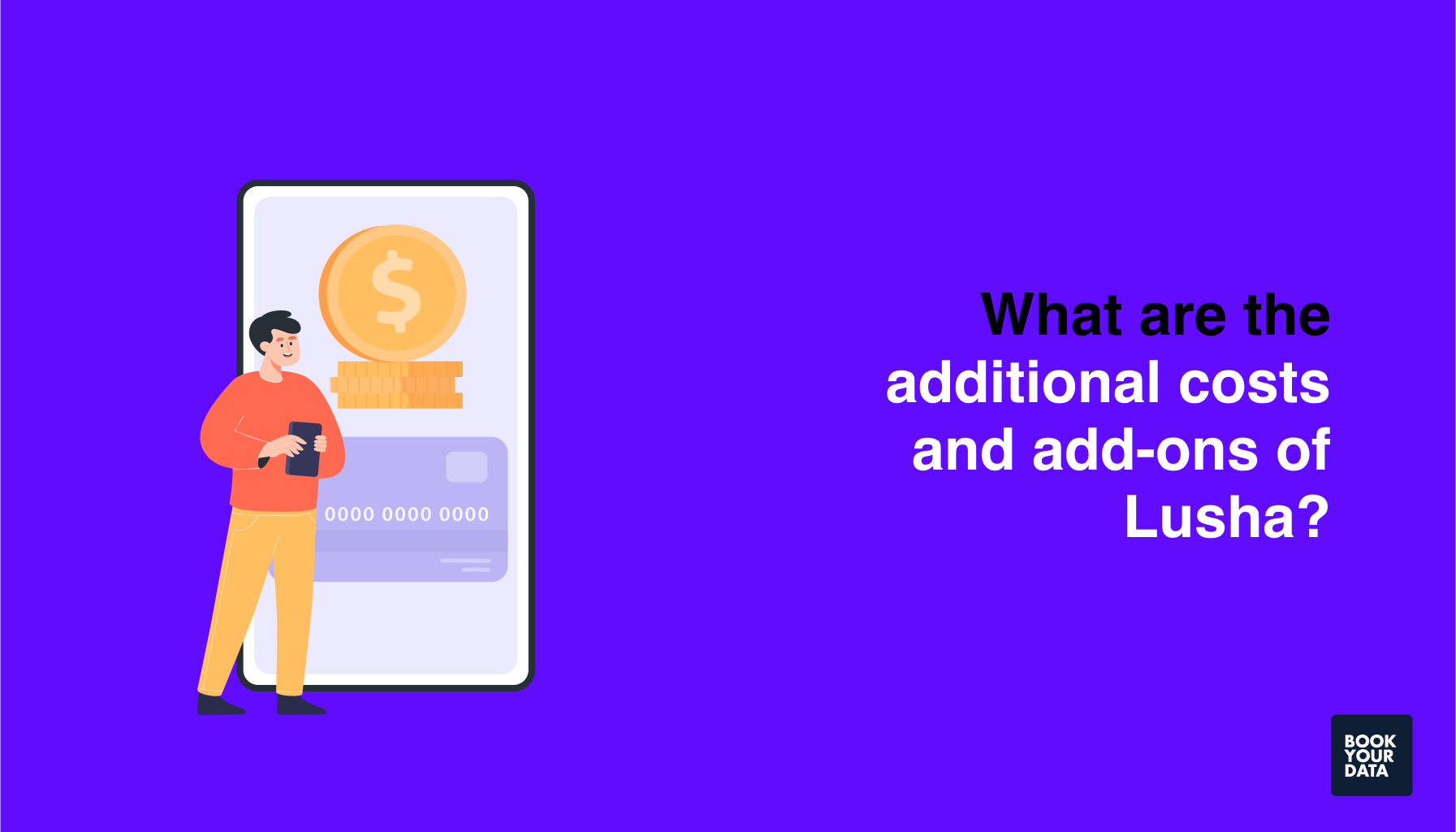
The additional costs and add-ons of Lusha are related to purchasing extra credits, adding more user seats, and accessing advanced features that are not available in the base subscription. Users who exceed their monthly or annual credit allowance can buy additional credits for an extra fee, but pricing varies by plan and credit bundle size.
Add-on features such as buyer intent signals, job change alerts, technology filters, Salesforce data enrichment, and API access are not included in all standard plans and require either an upgrade to a custom plan or a separate purchase as premium add-ons.
For example, API access is only available on the custom Scale plan and has its own pricing structure. Bulk CSV enrichment, larger bulk contact reveals, and advanced analytics may also cause extra charges or require a more expensive plan.
It is important to consider these additional expenses when budgeting for Lusha, as the total cost can increase depending on your team’s data usage and the need for specialized features.
BookYourData is the best Lusha alternative
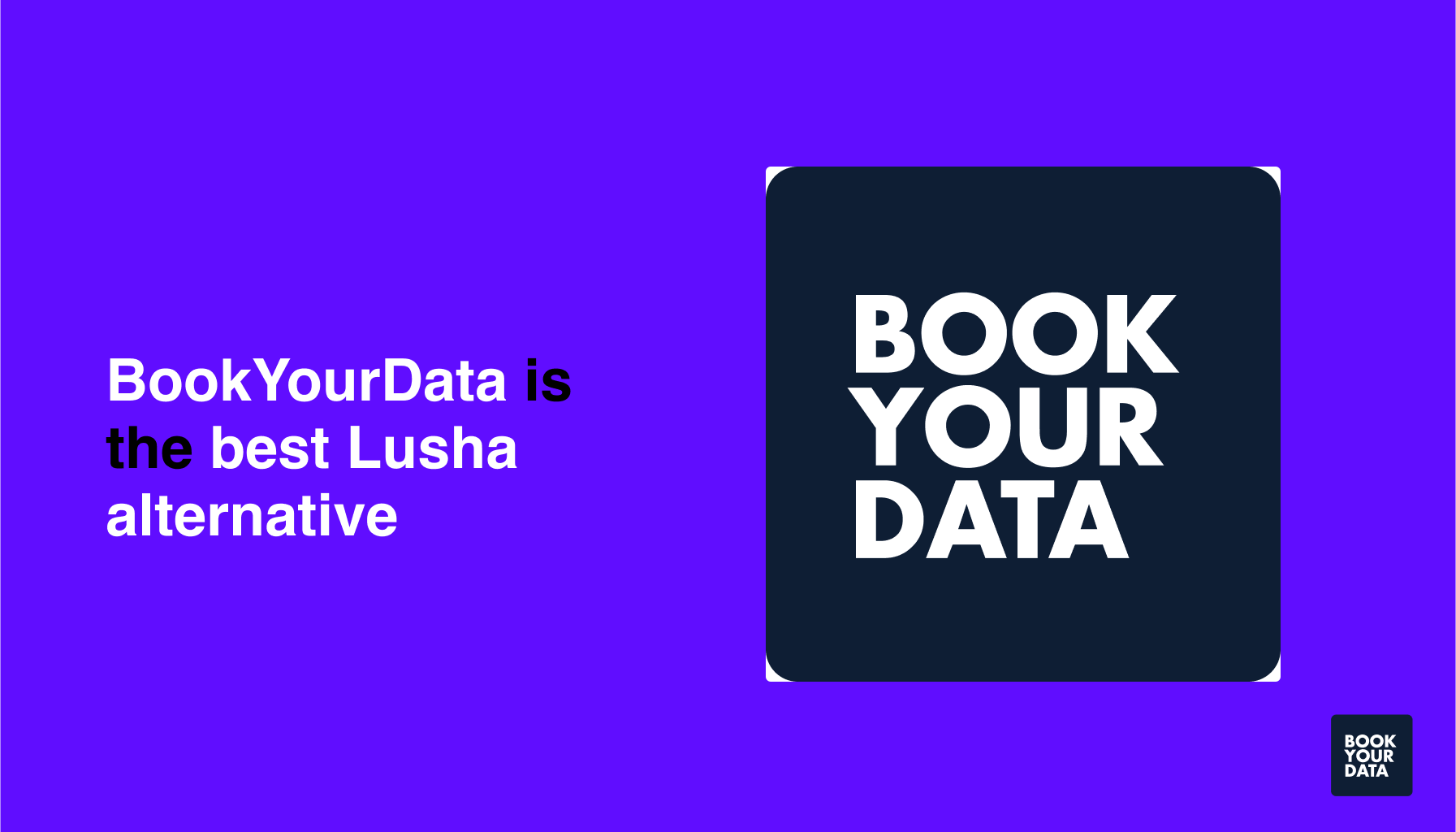
BookYourData is the best Lusha alternative because of its smart, risk-free choice for businesses that need high-quality, affordable, and scalable B2B data solutions.
Enjoy real-time email verification, comprehensive data points for each contact, and smooth CRM integration that makes exporting and managing your leads easy.
Download in bulk just in seconds with BookYourData.

Features
- Access to over 250 million verified B2B contacts across more than 200 countries.
- 97% data accuracy guarantee with real-time email verification and an eight-step validation process.
- A pay-as-you-go pricing model with never-expiring credits and no subscriptions is required.
- 100+ data points per contact, including direct emails, mobile direct dials, job titles, company info, LinkedIn URLs, technographic, funding rounds, and job posting data.
- Advanced filtering and segmentation with 100+ filters (industry, job title, location, company size, revenue, etc.) for precise targeting.
- Bulk list building and lead export in multiple formats (CSV, Excel, vCard).
- Direct integrations with popular CRM systems for seamless lead management and workflow automation.

Pricing
The pricing plans of BookYourData are listed below.
- Free pack: The free pack of BookYourData gives 10 free credits to users which they can access without getting any subscription. No credit card is required, and still, users can access all the enterprise features.
- Pay-as-you-go model: Pay-as-you-go costs $99 at 250 credits without the need for a subscription. Users can purchase credits that never expire, which allows them to buy only the required data when they need it.
More alternatives to Lusha
The more alternatives to Lusha include Apollo.io, ZoomInfo, and RocketReach.
Apollo.io
Apollo.io is a B2B sales intelligence and lead generation platform that helps businesses find, connect, and convert potential customers. Apollo.io provides access to a large database of over 275 million contacts and 70 million companies.
Features
- Apollo.io has a vast contact database with over 275 million contacts, which helps users buy email lists and gather contact details like email addresses and phone numbers.
- Apollo.io provides users with more than 65 filters to precisely target leads that match specific criteria such as location, industry, company size, and job title.
- Apollo.io gives AI-powered features such as Apollo AI writing assistant for crafting personalized emails and lead prioritization.
- Apollo.io uses intent data to identify prospects actively researching solutions.
- Apollo.io provides a browser extension for quick access to contact and company data while browsing the web.
Pricing
The pricing plans for Apollo.io are listed below.
- Free plan: The free plan of Apollo.io costs $0/month. It includes 120 email credits per month, basic access to email enrichment, LinkedIn workflows, and the Chrome extension.
- Basic plan: The basic plan of Apollo.io costs $49 per user per month when billed annually, or $59 per user per month when billed monthly. This plan includes up to 2,500 email credits per month, sequence automation, basic analytics, and limited integrations.
- Professional plan: Apollo.io’s professional plan costs $99 per user per month when billed monthly, or $79 per user per month when billed annually. It includes 9,000 credits per month, advanced automation, A/B testing, call dialing, CRM integrations, and uncapped sending limits with SendGrid.
- Organization plan: The organization plan of Apollo.io costs $149 per user per month when billed monthly, or $119 per user per month when billed annually. It offers 15,000 credits per user per month, advanced admin controls, custom permissions, API access, team performance reporting, advanced dialer, account-based automation, insight recommendations, and advanced security features.
ZoomInfo
ZoomInfo is a B2B database and business intelligence platform that provides businesses with contact information and company insights for marketing, lead generation, and sales outreach.
Features
- ZoomInfo provides a vast collection of business contacts to help sales and marketing teams connect with the right decision-makers.
- The platform ZoomInfo offers a number of filtering options and allows users to find prospects based on criteria such as industry, company size, and job title.
- ZoomInfo gives real-time intent data to help businesses identify prospects actively who are researching relevant topics.
- ZoomInfo integrates easily with various CRM and marketing automation platforms so that enriched and accurate data flows smoothly between systems.
Pricing
The pricing plans of ZoomInfo are listed below.
- Lite plan: ZoomInfo offers a 14-day free trial plan without a credit card, and allows 10 contacts per month.
- Professional plan: This plan costs $14,995 per year. It includes advanced search capabilities, data enrichment, integration options, and 5,000 bulk credits annually.
- Advanced plan: The advanced plan of ZoomInfo costs $39,995 and offers all professional plan features and real-time buying intent signals, API integrations, enhanced automation tools, and 10,000 annual bulk credits.
- Elite plan: The elite plan starts at $40,000 per year and includes all advanced plan features, intent data, detailed organizational charts, technographics, and 20,000 bulk credits annually.
RocketReach
RocketReach is an email or contact-finding platform that provides verified email addresses, phone numbers, and social media profiles of professionals and potential customers to businesses that wish to expand or start a sales outreach.
Features
- RocketReach provides a vast database with contact information for over 700 million professionals and 60 million companies worldwide.
- RocketReach provides advanced search filters to help users find specific contacts based on job title, industry, and location.
- RocketReach tracks the online behavior of the target contacts, like website visits and purchase history, helping the business understand the target’s buying intent.
- RocketReach also provides a messaging tool that helps users directly contact their targets through their platform.
- RocketReach provides an AI model that recommends relevant contacts based on their previous interaction, interests, and search behavior.
Pricing
The pricing plans of RocketReach are listed below.
- Essential plan: The Essentials plan costs $63 per month if billed monthly, and $421 per year. It includes 1200 exports per year, unlimited personal and professional emails, advanced search filters, AI email writer, browser extensions, API access, and Zapier integration.
- Pro plan: The Pro plan costs $1069 per year if billed annually, and $126 per month if billed monthly. It provides mobile phone lookup plus direct dial, increased email lookup credits, bulk company search, and CRM integration including LinkedIn, HubSpot, and SalesLoft.
- Ultimate plan: The ultimate plan costs $270 monthly or $2,689 if billed annually. It provides up to 500 annual lookups per user, full API access, Salesforce integration, team collaboration, and detailed organizational information.
Is Lusha pricing more cost-effective than Apollo.io for small B2B teams?
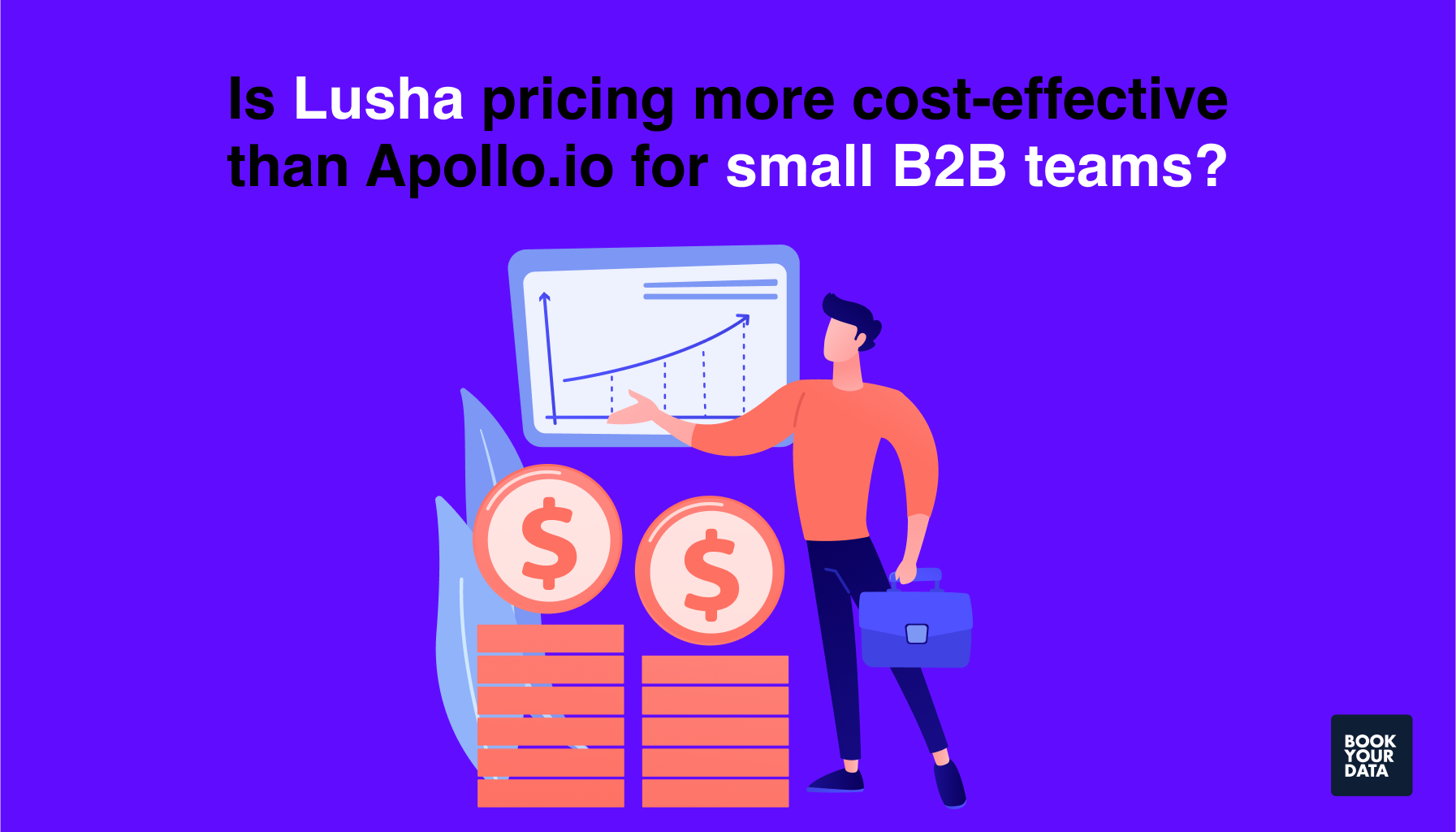
No, Lusha’s pricing is not more cost-effective than Apollo.io for small B2B teams as Apollo.io offers more credits per dollar and unlimited email outreach, as compared to Lusha. Apollo.io includes advanced features such as built-in outreach tools, automation, and analytics, which are not included in Lusha’s lower-tier plans. Lusha’s single credit system offers flexibility in using credits for either emails or phone numbers, but it has higher credit costs for mobile numbers. Apollo.io provides more contacts, more features, and greater scalability for small B2B teams as compared to Lusha within the same budget. Lusha is ideal for teams that prioritize data enrichment or need fewer contacts, but Apollo.io’s pricing is better for cost-conscious teams that need high-volume prospecting.
Does Apollo.io offer more credits or features at a lower cost than Lusha?
Yes, Apollo.io offers more credits and features at a lower cost than Lusha. Apollo.io’s paid plans provide unlimited email credits, higher mobile/export credits, and advanced features like email sequences and a built-in dialer, while Lusha’s credits are more limited, and mobile numbers cost more credits.
Does Lusha provide better ROI than D&B Hoovers for lead generation?

Yes, Lusha provides better ROI than D&B Hoovers for lead generation, especially for teams focused on quick and targeted outreach. Lusha is good for its ease of use, quality contact data, and lower cost, which makes it ideal for targeted prospecting, while D&B Hoovers’ pricing is higher and based on custom quotes, which can be expensive for small businesses.
Is Lusha’s pricing more predictable than Seamless.AI’s premium model?
Yes, Lusha’s pricing is more predictable than Seamless.AI’s premium model. In the Lusha vs. Seamless.AI comparison, Lusha offers transparent, tiered pricing with clear monthly or annual costs, and set credit limits. Seamless.AI provides customizable, credit-based plans with frequent changes, and their pricing details are not public.
Can Lusha replace ContactOut as a cost-effective LinkedIn prospecting tool?
Lusha can replace ContactOut as a cost-effective LinkedIn prospecting tool for B2B teams that need comprehensive company data, CRM integration, and advanced filters. Lusha offers high-quality, accurate B2B contact data and user-friendly features. ContactOut provides more personal email data, deeper LinkedIn integration, and a lower cost per contact.
How does Lusha’s pricing structure affect LinkedIn outreach scalability?
Lusha’s pricing structure affects LinkedIn outreach scalability by using a credit-based system, such as one credit per email and ten credits per phone number. These limits make large-scale prospecting costly and require upgrading to higher-tier plans for sustained, high-volume outreach, and also restrict scalability for growing teams.
Do B2B marketing teams find Lusha’s pricing model restrictive for scaling campaigns?
Yes, B2B marketing teams find Lusha’s pricing model restrictive for scaling campaigns. Lusha uses a credit system, with limits on how many emails and phone numbers you can access each month. B2B marketing teams run out of credits or need to pay for higher plans when they try to reach more contacts.
Is Lusha a better value-for-money option than BookYourData for B2B lead generation?

No, Lusha is not always a better value-for-money option than BookYourData for B2B lead generation. Lusha offers accurate data, strong integrations, and user-friendly features, but its credit-based subscription is costly for high-volume prospecting. BookYourData uses a pay-as-you-go model and is more flexible and cost-effective for teams that need large contact lists.
What is the difference between Lusha and Zoominfo?
The difference between Lusha and ZoomInfo is that Lusha offers transparent, affordable pricing and is designed for small to medium-sized businesses. In the Lusha vs. ZoomInfo comparison, ZoomInfo provides a much larger database, advanced analytics, and broader sales intelligence features, but requires custom annual contracts starting around $15,000.
How do Lusha’s credit-based pricing and BookYourData’s pay-per-list model compare?
Lusha’s credit-based pricing and BookYourData’s pay-per-list model compare in a way that the credit system of Lusha deducts an appropriate number of credits on the type of information users access. BookYourdata’s pay-as-you-go model does not require subscription and users can access all enterprise features.
[CTA1]
[CTA2]

